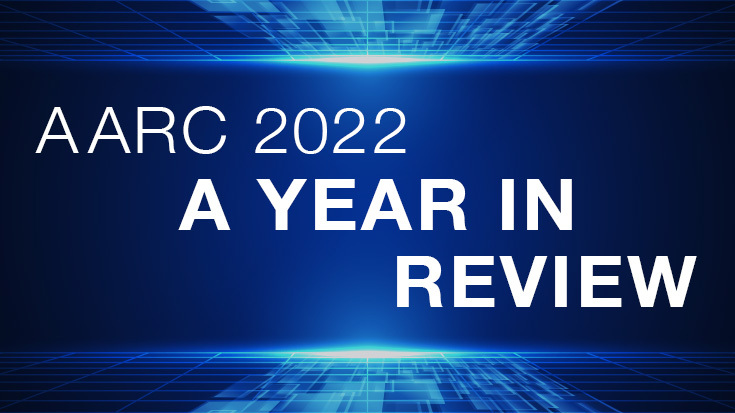
The Big Pivot
The year 2020 will go down in history as a time when millions of lives were lost to a horrific disease, and life as we knew it came to an abrupt halt. But while most of the world locked down, stayed home, and minimized their risk, respiratory therapists put on their battle gear and jumped into the fray.
For them, COVID-19 was not just a disease to protect themselves against; it was a disease that was ravaging their patients. The days were long and grueling, and anxieties ran high as they did their best to adapt to the new reality.
In short, they had to pivot, and they had to pivot big time. It soon became clear that the AARC would have to do the same to ensure members would continue to receive the membership services, educational support, and advocacy they had come to expect from their professional organization.
As the year unfolded, that’s precisely what your Association did.
Getting information out
The first order of business for the AARC was to gather as much information as possible about the spread of this new virus and how it affected people who contracted it. The Association monitored the situation as hospitals in the Pacific Northwest began to be overwhelmed with patients. When the virus hopped from the west coast to the east coast, our leaders continued their vigilance, reaching out to various medical groups and organizations to offer their support and guidance on treating patients.
Best practices were nonexistent, and it was all largely conjecture at first. Still, studies were quickly conducted – including a number of them published in the AARC’s scientific journal, Respiratory Care — to determine what was working and what wasn’t. Then, as the results rolled in, the AARC began disseminating the information to its members through multiple venues.
Chief among them was the AARC LIVE! 2020 Virtual Learning Event, Leading Beyond COVID-19, that took place over four days in June. The online conference featured tracks geared to adult acute care, leadership and management, education, and leading perspectives. Topics covered everything from COVID-19 phenotypes and what they mean to the safe and effective delivery of aerosolized medications, to supply chain management during a pandemic, and more. Leading RTs and physicians from across the country made up the program faculty.
The AARC also joined forces with the Strategic National Stockpile (SNS) to provide online training on the mechanical ventilators in the stockpile for RTs and information on the allocation process. Sessions that took place during the pandemic built upon the Association’s long-standing partnership with the SNS to ensure respiratory therapists would be ready to operate these ventilators when the need arose.
There for members
Since several RTs traveled to the hardest-hit areas early or simply needed a place to stay away from home while working to minimize their exposure to their families, the AARC partnered with Hilton Hotels and American Express to offer free lodging for these brave clinicians. Even after the free rooms offer ended on May 31, the AARC asked Hilton to continue its support of AARC members by providing them discounts through the end of June.
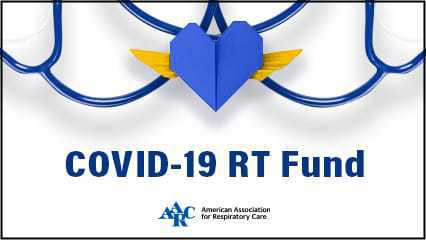
As the summer wore on and the virus surged in various places around the country, more and more therapists were stricken during the course of caring for patients. The Association went above and beyond to provide resources to help them recover and cope. Leaders set up an AARC COVID-19 RT Fund to provide monetary support to the families hit the hardest – those who lost loved ones to the disease.
The fund opened up in August, and the Association began asking key vendors in the respiratory care industry to step up and help. Companies did just that, with donations rolling in over the ensuing months from Vapotherm, Drager, ZOLL, and Ventec Life Systems, among others.
Guarding the profession
The AARC kept a close eye on moves being made across the country to deal with the shortage of mechanical ventilators and licensed RTs to handle the ever-increasing patient load presented by COVID-19. While recognizing that accommodations would have to be made to maintain care, the Association wanted to make sure those accommodations were being made wisely.
A joint statement signed by the AARC and five other leading medical associations went out in March, stating that attempting to ventilate multiple patients with a single ventilator was inadvisable and potentially dangerous.
The Association developed a new Guidance Document to address critical issues in the care of patients with SARS-CoV-2 and disseminated it along with the joint statement. The document was based on clinicians’ experiences in China, Italy, as well as Seattle and New York in the U.S., where the initial outbreaks occurred.
Association leaders joined leadership from the AARC Board of Medical Advisors in April to respond to a new video ventilator course to train non-ICU clinicians to support the critical care team in the ICU. They noted that while the video had merit amid overwhelming need caused by the pandemic, the Association was not endorsing its use in non-pandemic times or by any facility during the pandemic that was not experiencing a patient surge.
“The AARC absolutely believes the best person to care for the patient’s cardiopulmonary care is the respiratory therapist,” wrote the leaders.
In May, the AARC joined the New York State Society for Respiratory Care in a joint statement opposing a proposal from a local legislator suggesting that a local RT school could easily train nurses to manage mechanical ventilators in the course of a few hours.
“Factors such as increased emphasis on evidence-based medicine, focus on respiratory disease management, demands for advanced patient assessment, and the growing complexities of health care and equipment clearly mandate that respiratory therapists achieve formal academic preparation commensurate with an advanced provider role,” noted the statement.
A joint statement from the AARC and the American Heart Association was issued in December calling for strict adherence to protective measures as cases began to rise and deaths continued to increase.
“Protecting health care workers and other essential personnel, ourselves, our families, and most of all the patient population can help alleviate the stronghold this deadly disease has placed on our daily lives,” noted the statement.
Telehealth gains
After years of working to include RTs in legislation related to telehealth, the AARC was pleased in July to report to the membership that CMS had officially confirmed that therapists could provide services via telehealth during the pandemic.
The Association published a Q&A explaining the waiver included in the CARES Act and what it could mean for therapists who wanted to access their patients via telehealth platforms.
While the traditional Capitol Hill Lobby Day was canceled due to the pandemic, AARC advocacy efforts on behalf of RTs in the telehealth setting continued throughout the year as well, with the hope that the progress made in this area during COVID-19 could be made permanent.
These efforts continue today as a part of the AARC’s ongoing advocacy initiatives.
Taking it to social media
The AARC took its mission to support RTs to social media, too, creating a series of cover photos and sharable graphics for Facebook, Twitter, and LinkedIn. Using the hashtag #RTSTRONG, the resources aimed at harnessing the power of RTs everywhere, and their friends and families, in the battle to ensure the nation knew the role therapists were playing in the pandemic.
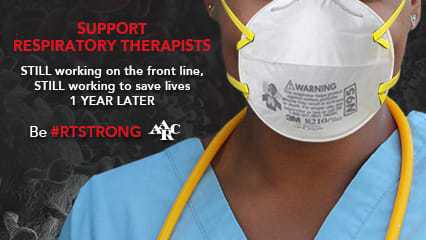
We had plenty of help from the media, which took notice of that role in articles and TV coverage in cities and towns all across the nation. The AARC collected these stories and housed them on a special page on the Association website so that therapists could read and watch the coverage they were getting during the pandemic.
AARC leaders also gathered for a special video message thanking RTs for their service during these unprecedented times, again using the hashtag #RTSTRONG. The video went up on the Association’s YouTube channel in June.
We can do this
Perhaps the most significant undertaking for the Association during the pandemic, though, came in November and December when leaders replaced the long-planned AARC Congress in New Orleans with an all-virtual event that took place over four days spread between the two months.

While attendees did miss the chance to be in the same room together, they didn’t miss a moment of the typical AARC Congress experience. Opening and closing keynote addresses took place, the program was full of all the lectures and Open Forum presentations you’d get in person (including many dealing with COVID-19), the Awards Ceremony went off without a hitch on YouTube, Zoom chat rooms were set up so people could still network, and the Flag Folding Ceremony went on as planned.
A virtual Exhibit Hall brought everyone up-to-date on the latest in technology, and attendees were even treated to a virtual concert by country singer Billy Dawson – who earlier in the year wrote a special song for the AARC family battling COVID-19 on the frontlines during COVID-19.
National Respiratory Care Week was also celebrated throughout the country last year. It was even more special than usual, with RTs having received so much recognition for the great work they do from so many different media outlets across the nation and around the world.
Taking care of business
Non-pandemic business continued in earnest throughout 2020 as well.
Years of work culminated in January when the AARC Board of Directors released an Advance Practice Respiratory Therapist Scope of Practice. The document had been in development since 2015 by leaders from the AARC, NBRC, and CoARC.
The scope of practice states that an Advanced Practice RT may perform medical acts, tasks, or functions in accordance with state licensing laws that are –
- Related to the care of persons with problems affecting the cardiovascular and/or cardiopulmonary systems;
- Delegated by a supervising physician to an APRT;
- Within the scope of practice identified in collaboration with the supervising physician;
- Appropriate to the APRT’s education, experience, and level of competence; and
- Related to the prescribing, ordering, procuring, dispensing, and administering of drugs, medical care, and medical devices related to the cardiovascular and/or cardiopulmonary systems.
The Association celebrated with members of the Ohio Society for Respiratory Care when a bill was introduced into the Ohio legislature in December to license the Advanced Practice Respiratory Therapist in the state.
In October, leaders took part in a CMS technical expert panel on home mechanical ventilation. The two-day virtual conference looked at five diagnostic categories where home ventilation might be used, with representatives giving presentations to inform the decision-making process.
The conference came on the heels of CMS’s decision in April to remove ventilators from the competitive bidding system, something the AARC has worked tirelessly for alongside other organizations for many years now.
The Association supported legislation aimed at protecting off-campus pulmonary rehabilitation programs and reversing the youth tobacco epidemic in 2020.
Despite the pandemic, work also forged ahead on upgrading the AARC’s Virtual Museum, which houses treasured documents, photos, and other memorabilia related to the history of the respiratory care profession. The facelift went live in April.
And in keeping with the Association’s ongoing mission to support members in need, the AARC was there for members who lost property due to natural disasters. This year the Association’s Disaster Relief Fund was activated for victims of the Puerto Rican earthquakes and for members in California who experienced wildfires, Iowa who endured severe weather and flooding, and Louisiana, where Hurricane Laura wreaked her havoc.
2020 AARC Annual Financial Report
In February 2021, the AARC engaged the public accounting firm of Howard, LLP to conduct an audit of its financial operations. They issued an unqualified opinion stating that the AARC’s financial statements were presented fairly and conform to Generally Accepted Accounting Principles (GAAP).
In 2020, AARC’s total revenue was $7,785,167 and total expenses were $8,720,666. Figures 1 and 2 highlight the sources of revenue and expenses.
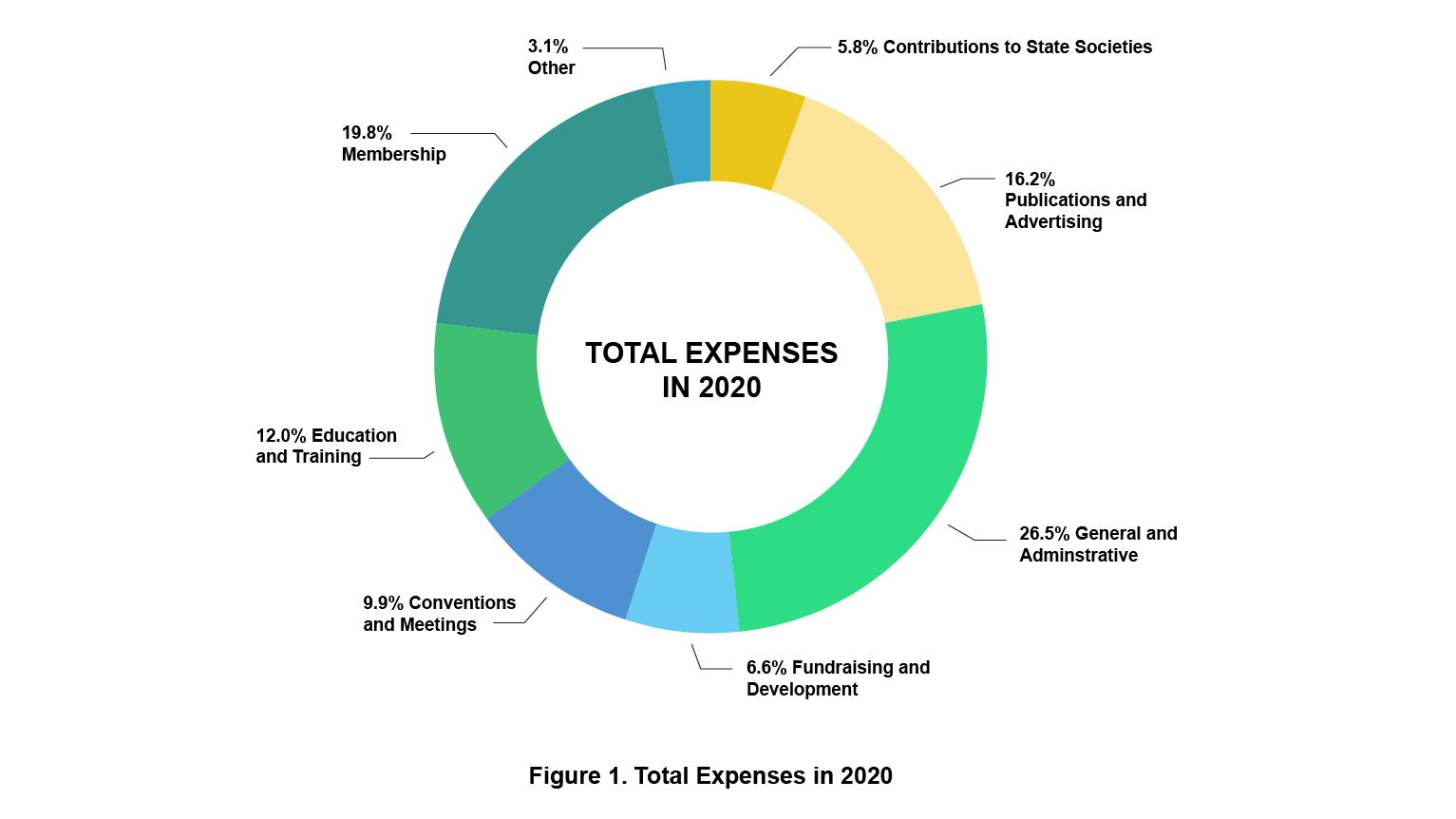
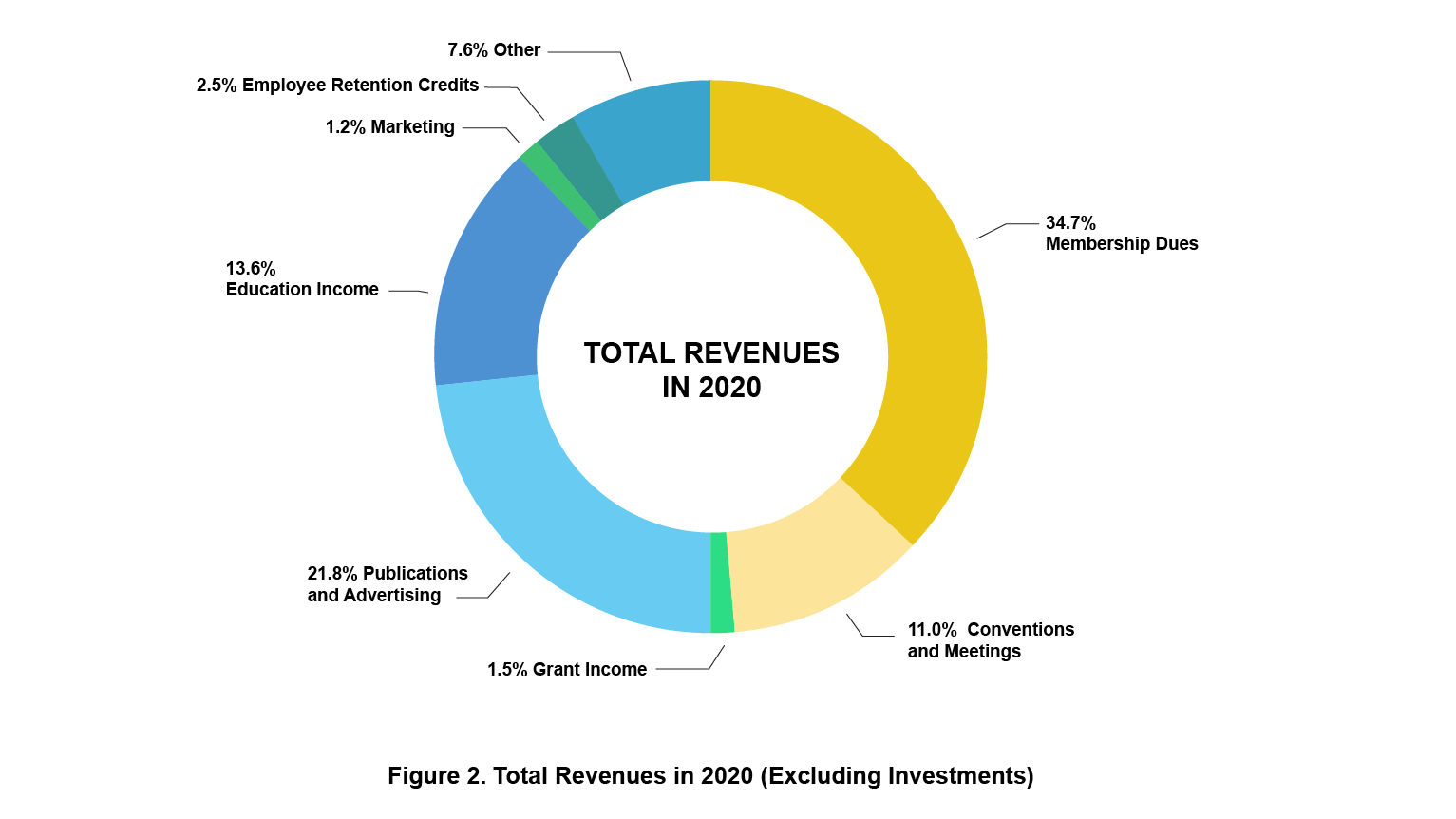
Never forget
Most of the world will remember 2020 as a year when life did an unwanted 180-degree shift. However, respiratory therapists will remember it as a time when they rose to the occasion, showed what they were worth, and saved thousands of lives in the process with the care they were able to provide.
The AARC was with them every step of the way, making sure they had what they needed to push through the worst of times and plan for a better future ahead.
Email newsroom@aarc.org with questions or comments, we’d love to hear from you.





